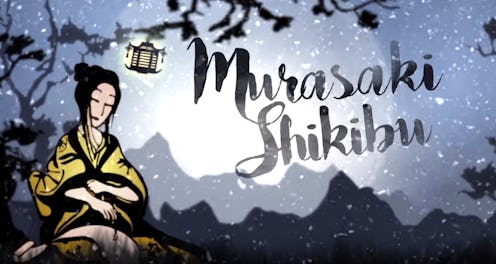Books
The Tale of Murasaki Shikibu: The First Novelist

It's terribly ironic yet also historically and socially expected that men would dominate the world of publishing. Expected because what art forms aren't cishet white men proposed by society, their peers, or themselves to be the best at? And ironic because the first novel and arguably the subsequent industry it spawned are the work of a Japanese woman named Murasaki Shikibu.
In their series entitled, "Ordinary Women: Daring To Defy History," Feminist Frequency highlights women whom history has glossed over. The seriesnot only inspires and teaches young, female-identifying people, but also to encourages content and media creators to see these stories and stop using "historical context" to exclude women from books, TV, film, and video games. I say "historical context" — air quotes completely intended — because there was never a time in history where women were entirely passive. Women have always been revolutionary.
Anita Sarkeesian, the founder of Feminist Frequency, host of Ordinary Women, Buffy the Vampire Slayer enthusiast, and professional troll warrior, discussed why the team decided to call these legendary women, ordinary. "A video series devoted to women throughout history who defied the stereotypes and lived remarkable lives. Although each of them is extraordinary, they can help us re-imagine the world as a place where women doing revolutionary things isn't incredible at all, it's just normal," she says.
The second woman in the series, Shikibu's tale is one of triumph in a society not built for her nor any other woman's success. In her time, it was rare even for a woman's name to be recorded, making it almost impossible for a woman of any class or kind to leave a legacy. Shikibu lived a cloistered life, wherein she was often kept out of public view, never seen except behind screens or curtains.
An important historical note, Sarkeesian adds, is that although women like Shikibu lived immensely restricted lives, they were still expected to learn and be educated. This was where Shikibu began to shine, becoming dubbed a sort of literary prodigy for her proficiency in both Japanese and Chinese literature.
After a short marriage to a much older man who passed away after a short time (but not before impregnating Shikibu), the young widow, along with her daughter, began working on what would be the world's first novel, The Tale of Genji. What separated her work from those of writers before her, was that The Tale of Genji was not just a linear chronicling of events, but rather a piece of art which offered psychological and emotional insight into the characters and what it means to be human.
While the tale was about a prince, Shikibu, like many female-identifying creators, positioned powerful, intriguing, and complex female characters around him, because both then and now, stories with female main characters are often passed over by males who are unaccustomed to texts that don't directly represent their gender. Shikibu, through The Tale of Genji, was able to give readers a look at what it felt to be a woman.
Her story didn't end with writing one novel. She continued to push back against stereotypes and defy societal expectations. For more, check out the full video on Shikibu's amazing journey, below.
Images: YouTube (Feminist Frequency)